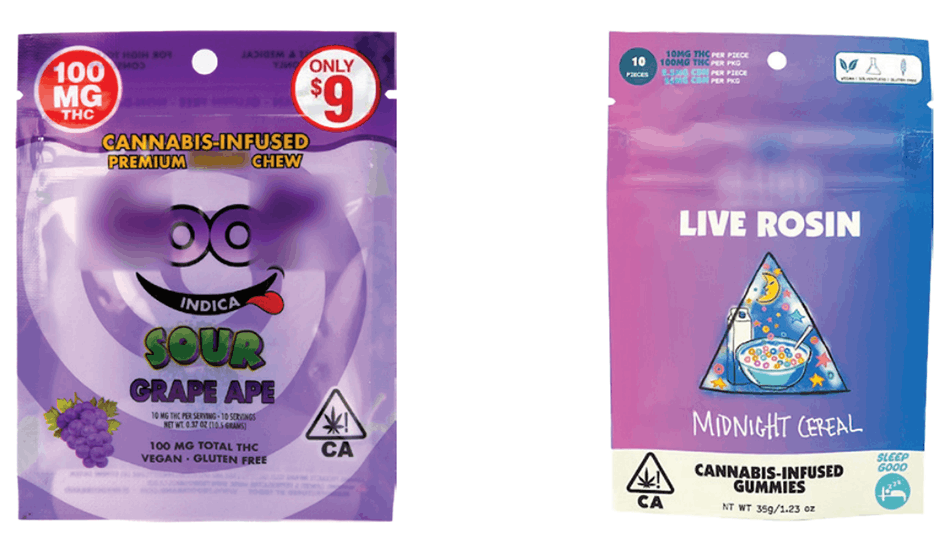Highlights;
Summary of California State Auditor’s Report on Cannabis Regulations
-
Problematic Packaging and Enforcement:
- The California Department of Cannabis Control (DCC) lacks clear guidelines on packaging, leading to inconsistent enforcement. Packaging designs deemed attractive to children are often subjective.
- The DCC does not adequately track or penalize repeat offenders, with some businesses violating regulations multiple times without increased penalties.
-
Flavors and Strain Names:
- Flavored inhalants and strain names like “Lemon Cherry Gelato” may attract children and require stricter regulation to prevent youth appeal.
-
Public Health Concerns:
- A 469% increase in poison control calls related to children ingesting cannabis (from 148 in 2016 to 842 in 2023) highlights a significant public health issue.
-
Unregulated Products:
- Much of the issue stems from unregulated or illegal cannabis products, which are more accessible to children than regulated ones, complicating enforcement efforts.
- California produced 11.4 million pounds of unregulated cannabis in 2024, compared to 1.4 million pounds regulated, indicating a vast illicit market.
-
Resource Limitations:
- The DCC inspects only about half of its 8,900 licensees annually, limiting its ability to enforce regulations effectively.
-
Recommendations:
- Adopt Oregon’s pre-market packaging review process to ensure compliance.
- Prohibit images of food, candy, anthropomorphized characters, and certain fonts/colors on packaging.
- Implement stricter penalties for repeat offenders and improve tracking systems.
-
DCC Response:
- Acknowledges the challenges but argues that determining what attracts children is subjective and culturally influenced.
- Open to legislative collaboration but defends its disciplinary approach, emphasizing flexibility in evolving market trends.
This summary captures the key findings and recommendations from the auditor’s report, highlighting the need for regulatory tightening to protect youth and enhance enforcement efficacy.
A recent report by the California State Auditor, Grant Parks, highlights significant concerns regarding the state’s cannabis regulations, emphasizing the need for reforms in areas such as product packaging, business inspections, penalties, and the use of certain flavors and strain names like Lemon Cherry Gelato. The 53-page audit, released on August 7, identifies issues like packaging and strain names that appeal to children and inadequate resources within the Department of Cannabis Control (DCC) to monitor and penalize repeat offenders effectively.
Key findings from the audit indicate that current laws and DCC regulations lack specificity, leading to inconsistent enforcement of packaging compliance. Parks noted that the DCC fails to adequately discipline businesses that repeatedly violate regulations, with inconsistent documentation practices and insufficient checks on compliance history. Additionally, the report points out that the DCC’s regulations do not effectively prohibit enticing flavors in inhalants or regulate strain names that suggest appealing flavors to children, such as Cherry Pie or Tropicana Punch.
Parks recommended that lawmakers clarify prohibited design elements in packaging, improve documentation, and specify penalties for repeat offenders. He also suggested that California adopt a pre-market review process for packaging, similar to Oregon’s approach, which includes limiting certain strain names and prohibiting elements like cartoonish fonts and bright colors.
The audit revealed a 469% increase in calls to the California Poison Control System regarding accidental cannabis ingestion by children under five, from 148 in 2016 to 842 in 2023. Parks emphasized that edible THC products, with their appealing shapes, colors, and flavors, are particularly attractive to youth.
In response, DCC Director Nicole Elliott acknowledged the seriousness of the issue but highlighted that regulated products are less accessible to children due to child-resistant packaging and age verification. She noted that unregulated products, such as hemp-derived THC edibles, pose a significant threat and stressed the complexity of addressing the issue due to the prevalence of illicit markets.
The report also criticized the DCC’s enforcement efforts, pointing out that only half of the state’s 8,900 licensees are inspected annually. Parks highlighted that one licensee violated packaging rules four times without increased penalties, indicating a lack of accountability for repeat offenders.
In conclusion, the audit calls for stricter regulations and better enforcement to protect children from enticing cannabis products. While the DCC expressed openness to legislative collaboration, it defended its structured approach to discipline, emphasizing the subjective nature of determining what is attractive to children and the need for ongoing adaptation to cultural trends.
Source: https://www.cannabisbusinesstimes.com/us-states/california/news/15752583/california-could-tighten-cannabis-regulations-up-penalties-after-state-audit


